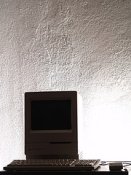Of course there was history to the area, the same as other areas, only different—in the sense that particulars are always slightly different. Yet there was indeed a history, events and figures to be chronicled, as well as gaps in memories and unrecorded scenarios forever lost, and who was to say the particulars did not have their gathered unique aspect.
But irrelevant. Lines crossing on a map, whiteness overlaid, a vacuum being replaced by things. Any chronicle of history is the chronicle of another's as well—in disguise.
North, East, West, South. There is always a newspaper. Should there not be an expected event, a traumatic event, a shocking event, or a victorious event, a lesser event will do. Space will be filled.
It was not that Martin was uncognizant of this. Not that he was unaware of the relative value (circulation value) of events. After all, that was his job: to find the best new event, the interesting one. The one that would translate to figures for the figure people.
However, this was ultimately a pessimistic scenario. In theory, though not always recognizable to even himself, Hope lurked intransigently. There would emerge a story to enact a paradigm. The story of stories. With an element of horror, of previously unperceived depravity, and shock—but with recognition. A narrative with moves like chess, advancing into the realm of redemption. From which fruit grows.
Yet it was not enough. There was even more to hope for. Or if not to hope for, at least to bemoan the inpossibility of hoping for. The thing, the sought-after: that the story, the event reported, contained the sense of moving-forward (not to snag upon the smudged notion of progress)—on an almost racial level (human race). An advancement of the species. To uncover that which has not occurred before.
Like a piece of new science does, only human. The human equivalent of an advance in technology.
And this was his terror: that the one to find the story wouldn't be him.
It isn't what people who know him would suspect. That anything other than the prospect of bodily pain would cause him terror. That his resident cynicism—polished and not particularly severe, but everpresent, toothpick-on-lip-tiltingly ironic cynicism—allowed any longing or trepidation about his actual work.
Martin on the one favorite stool at the Coney Isle, working the rumors, what the word is on the relationship of the 7-11 stickup on Jackson to a certain white-columned house on Park Drive and who works for whom and why it is ultimately a matter of money, and the difference between someone who has a lot of it and someone who stands to get a little of it from the first, who in turn stands to get a great deal more than the second gets from the transaction, but the second still gaining from his moderate point-of-view substantially more than existed before.


